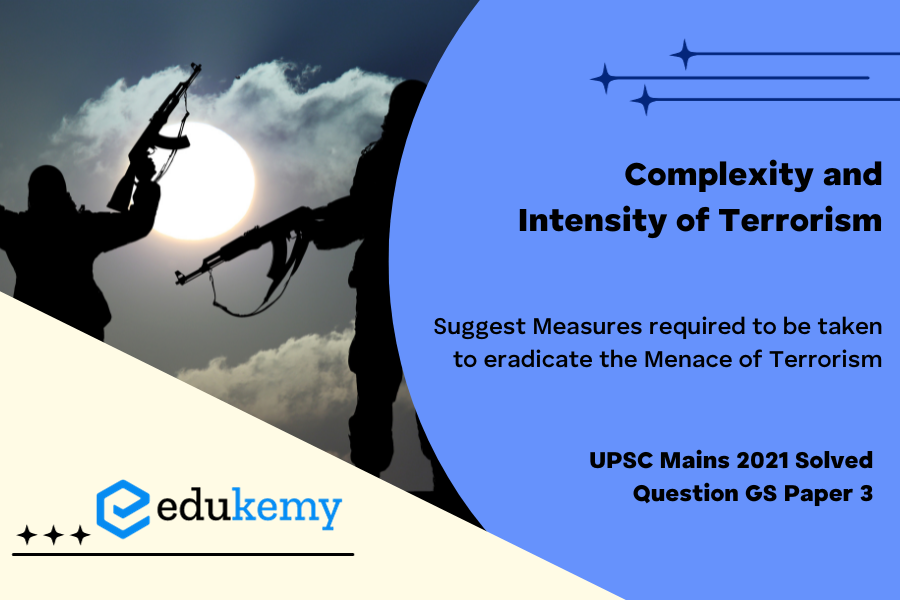Terrorism’s complexity lies in diverse causes and global linkages, driven by ideological, political, or religious motivations. Eradicating this menace demands international collaboration, intelligence-sharing, counter-radicalization efforts, and addressing root causes. Combating terrorism necessitates a comprehensive approach to disrupt networks and promote peace and stability globally.
UPSC Mains General Studies Paper – 3 Mains 2021
UPSC Mains Civil Services IAS Exam Question Paper – 2021
Contents
- 1 Approach
- 2 Answer
- 3 Introduction
- 4 Body
- 5 1. Strengthening Intelligence and Security
- 6 2. International Cooperation
- 7 3. Countering Radicalization and Extremism
- 8 4. Disrupting Financing
- 9 5. Socio-economic Development
- 10 6. Rehabilitation and Reintegration
- 11 Conclusion
- 12 In case you still have your doubts, contact us on 9811333901.
Approach
- Start with a Brief introduction of the keywords “terrorism”.
- Explain the complexity, intensity, linkages and obnoxious nexus of terrorism .
- Suggest measures required to be taken to eradicate the menace of terrorism.
- Conclusion accordingly.
Answer
Introduction
- Terrorism can be described as the deliberate and strategic employment of violence or the fear of violence with the aim of instilling fear, coercion, and intimidation within societies or governments. It is often driven by political, religious, or ideological motives and seeks to achieve specific goals through these means. India, with its diverse society and geopolitical dynamics, has had its share of experiences withterrorism.Forexample,The 2008 Mumbai attacks, carried out by a Pakistan-based terrorist group.
Body
The complexity, intensity, linkages and obnoxious nexus of terrorism : Terrorism is a complex and multifaceted phenomenon that exhibits various dimensions of complexity, intensity, linkages, and obnoxious nexus. Here’s are these aspects
- Complexity: It involves a range of actors, including individuals, extremist organisations, state-sponsored groups, and transnational networks. The complexity is further compounded by the evolving tactics and techniques used by terrorists, such as suicide bombings, cyber terrorism, and the use of unconventional weapons. For example, the 9/11 attacks in the United States showcased the complexity of planning and execution involved in a large-scale terrorist operation.
- Intensity: Terrorism often exhibits varying levels of intensity, ranging from sporadic attacks to prolonged campaigns of violence. The intensity can also be influenced by the geographic scope of the attacks and the number of casualties involved. The ongoing conflict with the Islamic State (ISIS) in Iraq and Syria illustrates the high intensity of terrorism, with the group controlling territories, conducting mass killings, and inspiring global acts of violence.
- Linkages: Terrorist groups can form linkages and networks, both domestically and internationally, to exchange resources, knowledge, and support. These linkages can facilitate the sharing of tactics, funding, and ideological propaganda. For instance, Al-Qaeda has established connections with various extremist organisations worldwide, providing them with guidance, training, and financial assistance.
- Obnoxious Nexus: Terrorism often thrives in an obnoxious nexus involving a blend of criminal activities, such as drug trafficking, arms smuggling, money laundering, and organised crime. Terrorist organisations exploit these illicit networks to finance their operations, acquire weapons, and generate resources. The Taliban in Afghanistan is known to be involved in the opium trade, using the proceeds to fund their activities.
Suggest measures required to be taken to eradicate the menace of terrorism: Eradicating the menace of terrorism requires a multifaceted approach that combines various measures at local, national, and international levels. Here are some key measures that can be taken to counter terrorism:
1. Strengthening Intelligence and Security
- Enhance intelligence gathering and sharing among law enforcement agencies to identify and disrupt terrorist networks.
- Invest in advanced surveillance technologies and tools to monitor potential threats and prevent attacks.
- Improve border security to prevent the movement of terrorists and illicit activities.
2. International Cooperation
- Foster international cooperation and information sharing among countries to track and apprehend terrorists operating across borders.
- Collaborate on intelligence sharing, capacity building, and joint counterterrorism operations.
- Strengthen international legal frameworks to enable extradition and prosecution of terrorists.
3. Countering Radicalization and Extremism
- Implement comprehensive counter-radicalization programs that address the root causes of radicalization and provide alternatives to extremist ideologies.
- Promote religious tolerance, social inclusion, and dialogue to counter extremist narratives.
- Engage communities, religious leaders, and civil society organisations in preventing radicalization and promoting resilience against terrorism.
4. Disrupting Financing
- Strengthen financial regulations and international cooperation to disrupt terrorist financing networks.
- Monitor and freeze assets linked to terrorist organisations.
- Enhance cooperation with financial institutions to detect suspicious transactions and implement effective anti-money laundering measures.
5. Socio-economic Development
- Address socio-economic disparities and grievances that terrorists often exploit.
- Invest in education, job creation, and poverty alleviation programs in vulnerable communities.
- Promote inclusive governance, human rights, and rule of law to reduce grievances and promote stability.
6. Rehabilitation and Reintegration
- Establish programs for the rehabilitation and reintegration of former terrorists into society.
- Provide psychological support, vocational training, and education to facilitate their reintegration and prevent recidivism.
Conclusion
- Tackling terrorism requires a multi-pronged approach that addresses the complexity and intensity of the threat. By addressing the root causes, enhancing security measures, disrupting financing channels, countering radicalization, promoting legal frameworks, building resilient communities, and providing rehabilitation and reintegration, the menace of terrorism can be effectively eradicated. Global cooperation, sustained commitment, and a holistic approach are essential in combating terrorism and ensuring a safer and more secure world for all.
In case you still have your doubts, contact us on 9811333901.
For UPSC Prelims Resources, Click here
For Daily Updates and Study Material:
Join our Telegram Channel – Edukemy for IAS
- 1. Learn through Videos – here
- 2. Be Exam Ready by Practicing Daily MCQs – here
- 3. Daily Newsletter – Get all your Current Affairs Covered – here
- 4. Mains Answer Writing Practice – here


